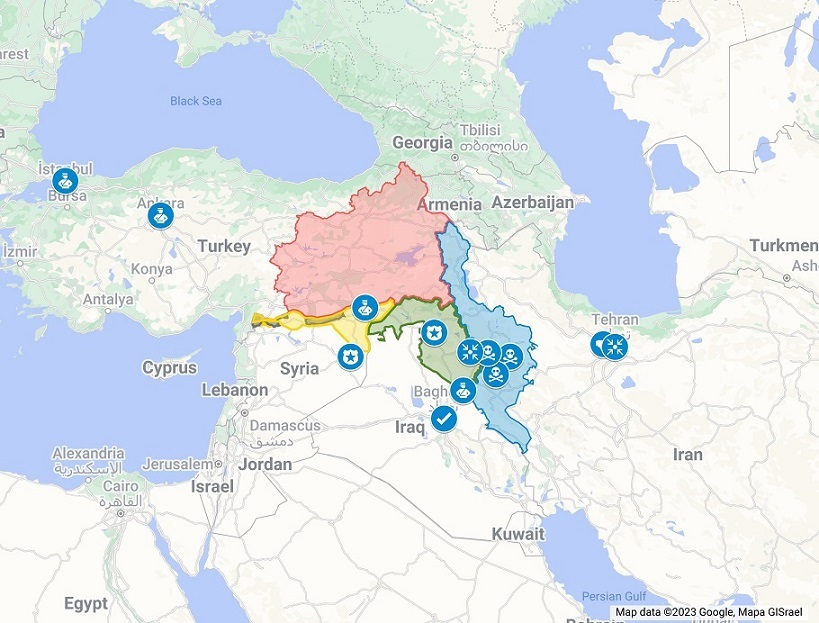1.1K
A weekly brief of events occurred in the Kurdistan regions of Iran, Iraq, Syria, and Turkey.
Iran
- The Iranian regime defied international opinion and hanged two protestors on Saturday morning. On Monday, dozens of demonstrators gathered in front of the Rajai Shahr prison in Karaj, where two more protestors face execution. The United Nations (UN) Human Rights Council condemned the regime’s “unfair trials based on forced confessions” and called for Iran to halt all executions. Dozens of additional protesters are facing execution, and at least nine are on death row. Concurrently, the Iranian regime has jailed more than 19,200 and killed at least 530, including 70 children, since the nation’s latest round of protests erupted on September 16. Further, the regime has besieged Javanrud for several weeks after anti-government protests took place in the city, arresting dozens of residents at random and killing a protester named Burhan Alyasi. That said, protests broke out in several Kurdish cities on January 1 to show solidarity with Javanrud, and a large number of demonstrators gathered at Alyasi’s funeral. Several Kurdish imams and sheiks also appealed to Iranian authorities for an end to the siege of Javanrud. The regime refused to lift the siege, however, and abducted several activists in Bokan, Marivan, Saqqez, and Sanandaj, including Siwan Ibrahimi, husband of jailed Kurdish teacher Zara Mohammadi. Moreover, Iran’s Islamic Consultative Assembly is attempting to pass a law barring Iranian officials from leaving Iran to prevent the transfer of capital. On a separate note, the Canadian government sanctioned several Iranian officials on Monday for repressing demonstrations. On January 6, the U.S. sanctioned six executives and board members of the Islamic Revolutionary Guards Corps (IRGC)-affiliated Qods Aviation Industries for supplying Russia with drones and the director of the Aerospace Industries Organization, which oversees Iran’s ballistic missile programs.
Iraq
- Kurdistan’s National Security Council announced the capture of two terrorists in Erbil who planned attacks on New Year’s Eve. A video showed the confession of the terrorists and the logistics of their plans.
- After taking several months of form, Iraq’s new cabinet approved 400 billion dinars in salary payments for Kurdistan’s employees for the next two months. The former cabinet reached a deal with the Kurdistan Regional Government (KRG), sending the region funds to pay public salaries, but it took the current government several months to release the allocated funds.
- Despite earlier promises, the Kurdistan Democratic Party (KDP) and the Patriotic Union of Kurdistan have note yet overcome issues of good governance in the region. A member of the Political Bureau of the Kurdistan Democratic Party (KDP) told Rudaw that the PUK “isn’t ready” to hold meetings yet.
- In a press conference on January 2, Rawa Samir, director of the Khanaqin office of the Kurdish areas outside the KRG, said that the Kurdish population had decreased significantly and dangerously in the Jalawla district from 45% to 10%. He attributed this decrease to Arabization policies, which have been reimposed on Khanaqin and Jalawla. “Thousands of Arabs are settled in the district, their records are being transferred, and they occupied houses, lands, and property of the displaced Kurds,” said Samir.
Syria
- After a scheduled tripartite meeting between Turkish, Syrian, and Russian defense ministers, Ilham Ahmed, the Co-Chair of the Syrian Democratic Council (SDC) Executive Committee, criticized the meeting describing it as “not in the interest of the Syrian people.” While Turkey is close to implementing normalization with the Assad regime meditated by Russia, the US remains opposed. “Turkey is always trying to get a green light to launch a ground attack on North and East Syria,” said Ahmed. Meanwhile, dozens of Syrian activists called protests in the Turkish-occupied areas, including in Afrin, against the normalization announcements by Turkish officials.
- The Syrian Democratic Forces (SDF) concluded a wide anti-ISIS (Da’esh) operation in the region, arresting “154 elements wanted by the judiciary,” including more than 100 active sleeper cells. The operation covered the al-Hol camp for Da’esh detainees and families of deceased terrorists. Moreover, on January 4, the SDF announced the arrest of a Da’esh leader in charge of financial affairs in the Deir Ez Zor area, accomplished with air support from the US-led coalition.
Turkey
- On January 5, Turkey’s Constitutional Court froze the funds of the Pro-Kurdish Peoples’ Democratic Party (HDP) in another step toward shutting down the party before the June elections. The ruling parties of Justice and Development (AKP) and its main ally, the Nationalist Movement Party (MHP), aim to close off the party and distract Kurdish voters in what will be a challenging election for President Erdogan. Blocking funds will put the HDP behind the opposition and ruling parties who receive aid for electoral campaigns. “Like the entire public, we have listened to the Constitutional Court’s decision that was made with political motives and against the law,” said Ebru Gunay, the HDP’s spokesperson. Earlier last week, the legal defense team representing the HDP in its closure case asked the constitutional court to postpone its ruling until after the elections.
- An Istanbul court convicted the Turkish Medical Association’s president, Dr. Sebnem Korur Fincanc, to three-years in prison. On October 26, Istanbul police arrested Dr. Fincanc after she called for investigations into Turkey’s use of chemical weapons against the Kurdistan Workers’ Party (PKK) in Iraqi Kurdistan. The Turkish court charged her with “spreading terrorist propaganda.” International watchdog agencies have accused Turkey of using chemical weapons.

